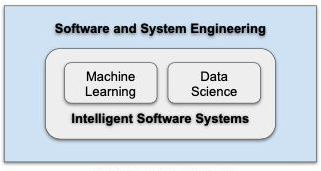
The growth in demand for expertise in data related fields has made the perspective of the future job market in line with such an interest. As it can be observed in the “World Economic Forum report”, the largest portion of technologies that companies are willing to adopt in the future concerns either data analysis or artificial intelligence.
Out of the top five technologies likely to be adopted by companies by 2027, four are covered by the different EDISS tracks (big data analytics, IoT, cloud computing, and digital platforms and apps).
On the other hand, a recent report by “LinkedIn” reveals that among top 10 skills companies need most in 2024, are analytics, problem-solving, and research[1].

EDISS educates IT professionals to engineer future generation intelligent systems. Figure 1 reports the main competencies required to properly engineer intelligent systems. While all those components are required, a big gap is still in place, where Data Science and ML are not yet properly integrated into the Software and System Engineering process. On the one hand, the data science community is dealing with the growing concern that the proof of concept results fail to produce impactful end-products. Data scientists are devoted to the realization of data pipelines processes that deal with data management and analytics processes, so as to first acquire, extract, clean and integrate data (i.e., the data management stage) to enable a data analytics and interpretation process (i.e., the data analytics stage). On the other hand, software and system engineers focus their attention on the engineering process of software, therefore collecting requirements and building system architectures that, more and more, deal with data collections and management. However, data scientists’ and software engineers’ processes are typically carried out in an independent manner ringing to the creation of sub-optimal systems.
EDISS bridges this gap by bringing together data scientists and software engineers to engineer data-intensive intelligent software systems. We intend to do so by bringing together software engineering educators working in data collection, data-driven assessment, and decision-making for both design- and runtime and software engineers, architects and data scientists working on data pipelines, data architectures, DataOps and in experimentation systems. Such synergy leads to sharing knowledge and expertise, and thus creates new ideas and impactful solutions.
Prospective jobs after graduation
Typical job titles of EDISS graduates include: Chief AI Officer, Senior Data Scientist, Senior Machine Learning Engineer, Robotics Software Developer, Data Architecture Designer. Machine Learning Engineer, Doctoral Researcher, Data and Integration Engineer, AI Specialist, Data Scientist, Backend Developer.
[1] linkedin.com/business/learning/blog/top-skills-and-courses/most-in-demand-skills
